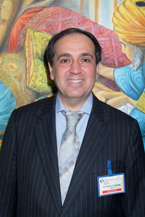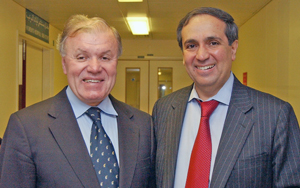Weill Cornellís Dr. Frank Chervenak welcomes Hamad Medical Corporation to Ian Donald School

Frank A. Chervenak, M.D
In the fields of clinical education and research, the Ian Donald Inter-University School of Medical Ultrasound* stands as an example of globalization in medicine at its best, said chairman of the department of obstetrics and gynecology at Weill Cornell Medical College, Frank A. Chervenak, M.D., during a recent visit to Qatar.
Dr. Chervenak, who is also Given Foundation Professor of Obstetrics and Gynecology at Weill Cornell, and chief of the specialty at NewYork-Presbyterian Hospital, was speaking at the opening of the first Ian Donald advanced course on ultrasound ever held in Qatar. The course took place at the Womenís Hospital, January 4-8, with about 150 physicians from Qatar, Saudi Arabia, Oman, the UAE, Egypt and Sudan attending the event.
Welcoming Hamad Medical Corporation as the newest branch of this worldwide network of over 20 institutions dedicated to education and research in medical ultrasound, Dr. Chervenak said that the aim was to bring out the best in practitioners in each country.

Professors Asim Kurjak and Frank Chervenak,
Directors of the Ian Donald Inter-University School
of Medical Ultrasound
Collaboration among physicians from WCMC-Q and HMC in the field of research is a particularly exciting development, said Dr. Chervenak: "Papers are being produced both in ultrasound, and in ethics where we are working together on a project. Iím very excited about this ó the Hamad team wants to do research, and itís fun for us to work with them."
Dr. Chervenak gave a number of presentations during Januaryís course, in which he discussed some of the ethical and legal challenges arising from the use of ultrasound, and the counselling of patients following identification of a fetal abnormality. He also looked at developments in the assessment of gestational age, and in using sonography in the first trimester of pregnancy.
"This is a landmark development in the history of Hamad Medical Corporation," said Dr. Ahmed, "it will improve the level of ultrasound practice not only in the Corporationís hospitals, but also in the private sector, which will be good for women in Qatar."
In addition to lectures and discussions, the course included teaching consultations, focusing on examination of challenging cases. With over 13,000 deliveries each year in the Womenís Hospital, and a high incidence of diabetes in the region, Dr. Ahmed noted that approximately 25 percent of patients coming to this tertiary referral center are high-risk.
Further activities now planned by the Qatar branch of the School include introduction of the year-long fellowship in advanced ultrasound, with places for up to 10 physicians from the region.
